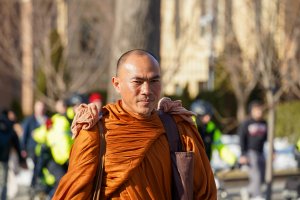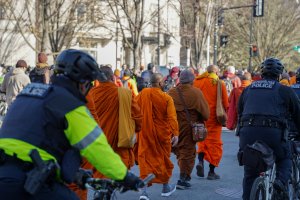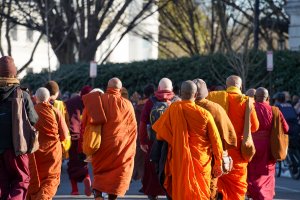Politics
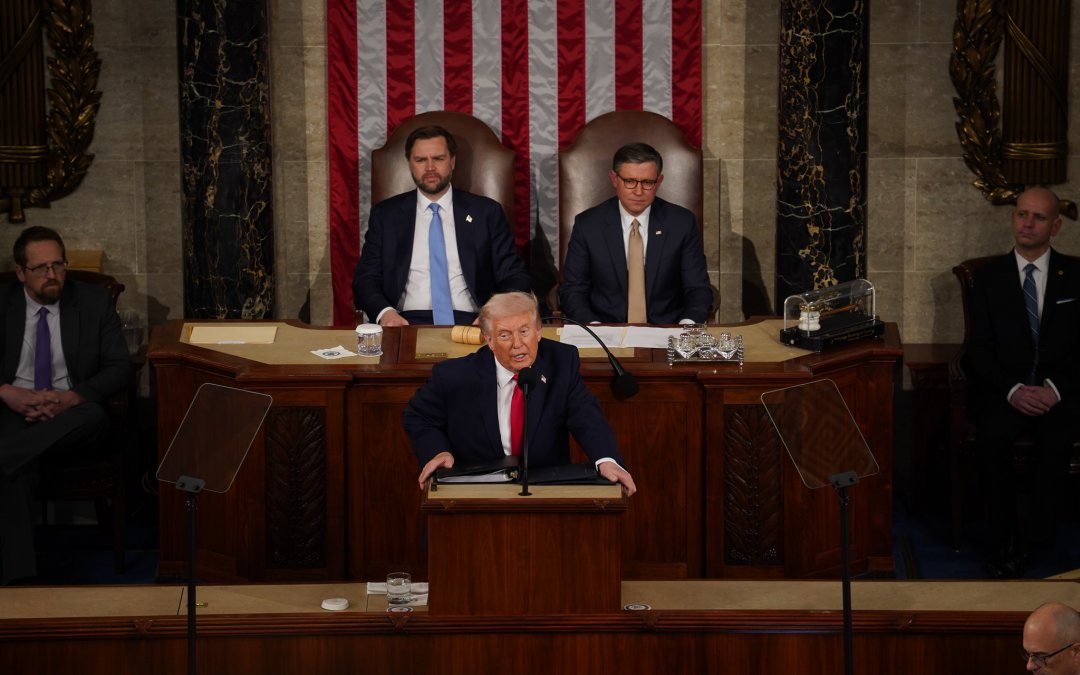
In Photos: Trump delivers longest State of the Union address in history
President Donald Trump set the record for the longest State of the Union address Tuesday evening.
read more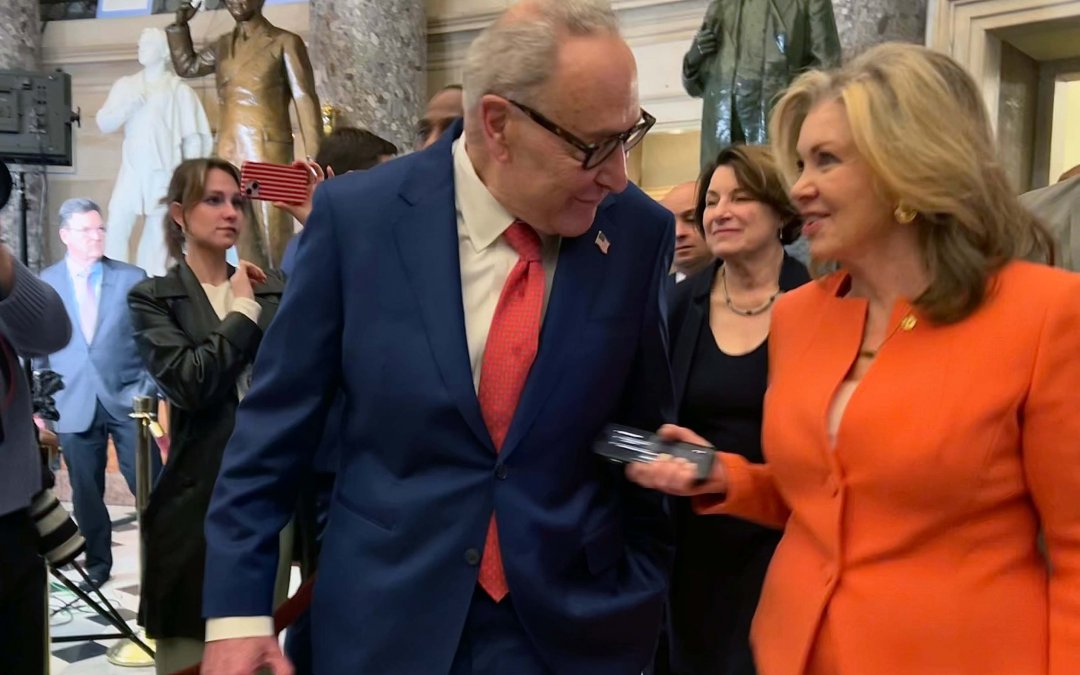
In Photos: Faces at the State of the Union
A look at who entered attended the State of the Union at the U.S. Capitol on Tuesday evening.
read more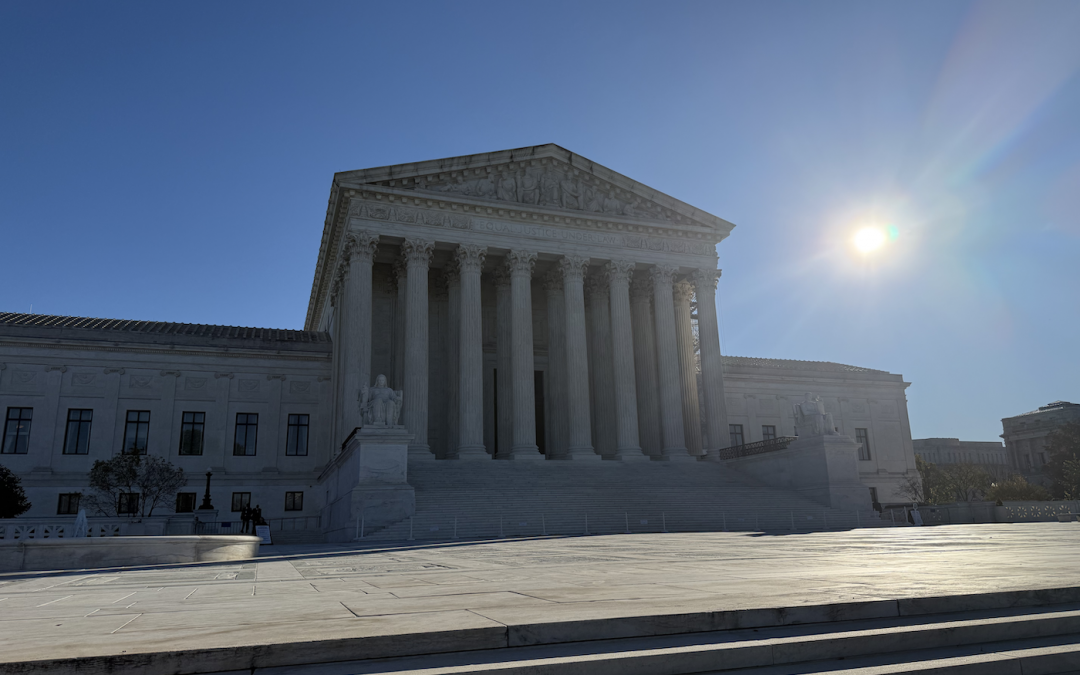
Supreme Court seems unlikely to require that counties compensate homeowners based on the market price when homes sell for less in foreclosures
Pung v. Isabella County challenges the High Court to require the local government to pay the debtor the fair-market value of the home minus the taxes they owed. Justices expressed concern that under this proposed interpretation of the Fifth and Eighth Amendments, the state would not be able to foreclose on homes to satisfy its debts.
read more
After 30 years, Supreme Court could redefine U.S.-Cuba trafficking disputes
Justices sparred over the meaning of “property” under the Helms-Burton Act, questioning whether a long-expired concession can expose cruise lines to lawsuits tied to Cuba’s confiscated assets.
read more
Supreme Court appears split on whether Exxon Mobil can sue Cuban companies
WASHINGTON — The Supreme Court on Monday seemed split over whether Exxon Mobil can override immunity protections for foreign companies and sue Cuban companies for expropriating property that Exxon initially owned. The case, Exxon Mobil Corp. v. Corporación Cimex,...
read moreChanting “board of lies,” protesters oppose Trump’s Board of Peace meeting on Gaza reconstruction
WASHINGTON — Two groups of protesters with strikingly different objectives demonstrated outside the inaugural meeting of President Donald Trump’s Board of Peace, at which world leaders pledged a combined $7 billion for Gaza’s reconstruction.
One group opposed Trump’s foreign policies while the other asked for the administration’s help in establishing a Sikh homeland in northern India.
“We don’t have any illusion that institutions like the Board of Peace will actually bring justice for all the atrocities we see, especially in Palestine,” said Brittany Parong, a speaker at the protest from the BAYAN DMV, an anti-imperialist Filipino organization. “It’s the Palestinian people that will free Palestine.”
During the meeting, world leaders discussed the next stage of a fragile ceasefire in Gaza. Trump announced the U.S. would pledge $10 billion to the Board of Peace, and five countries agreed to deploy troops to Palestine to take part in an international stabilization force. He also suggested a 10-day timeline to make a nuclear deal with Iran.
“Board of Peace is one of the most important and consequential things I think that I’ll be involved in,” Trump said at the meeting. “It does not just convene countries, it devises and implements, and real solutions happen.”
The meeting was held in the U.S. Institute of Peace, which now bears Trump’s name. Trump attempted to shut down the institute last year when he fired its board members. Although a federal judge blocked him, the fate of the institute remains in the hands of the courts.
Outside, protesters chanted “board of lies” and raised an array of concerns over the Board of Peace. They objected to Trump’s offer to give board seats to Benjamin Netanyahu and Vladimir Putin, both of whom are wanted for alleged war crimes by the International Criminal Court. The Palestinian Authority, the internationally recognized body that controls parts of the West Bank, was not invited to join the group, according to the New York Times.
“I came out today because we know that fascists work together time and time again,” Parong said. “That’s what history teaches us.”
Parong said that regular people from all movements, whether it’s the Palestinian struggle for liberation or the Philippine struggle for national democracy, must be in solidarity and confront their “class enemies together.”
Near the U.S. Institute of Peace, about 50 protesters wore black and white keffiyehs, waved Palestine flags, pounded on drums, gathered in a circle around speakers and poured red liquid over a cardboard doll of Trump.
Right next to the group holding up Palestine flags, another crowd of protesters wore dastars, a type of turban worn by Sikhs, and carried yellow Khalistan flags, representing the separatist movement to create a Sikh homeland. They called on Trump to allow them to join the Board of Peace.
Jagdeep Singh was one of these protesters. He said Sikhs are asking for Trump to pressure the Prime Minister of India, Narendra Modi, to have a referendum in Punjab, a region in northwest India, to gauge support for an independent Sikh state.
“We are homeless people,” Singh said. “Our land was before occupied by the British, now it’s occupied by India. So we do not have alternatives. We do not have the options. We can pray to the God, and we can request to the American administration to help the Sikhs.”
Protesters Don and Donna Powell held up signs reading “democracy dies with billionaires” and “worst government ever.” Donna Powell said that she feels that the Board of Peace is just another “Trump scam.” Don Powell added that the Board of Peace was another attempt by Trump to acquire money and power.
The protesters attacked Trump’s view of Gaza as good real estate for redevelopment.
“We don’t want his view where it becomes a luxury Rivera resort, and everybody that is currently there and now bombed is pushed out of the area,” Don Powell said.
Donna Powell said she wishes Trump would go through the United Nations to achieve peace through established mechanisms.
During the meeting, Trump said that the Board of Peace will work very closely with the United Nations and will “almost be looking over the United Nations and making sure it runs properly.”
“His ceasefire is very tenuous, and so what we really want is we want peace there,” Donna Powell said. “We want it to be rebuilt. We want the United States to help out with that. Whether that’s gonna be happening is another question.”
IMF executive board will soon consider a new $8.2 billion program for Ukraine
WASHINGTON – The International Monetary Fund was prepared to bring Ukraine’s $8.2 billion loan package to its executive board within days, after the war-ravaged country met requirements and secured other financing assurances from partner nations, the IMF’s top spokesperson said Thursday.
“The (Ukrainian) authorities have met all of the prior actions needed to move forward with the program request,” said Julie Kozack, director of the IMF communications department said in a press briefing.
Those prior actions included the submission of a draft labor code law to parliament on January 19 and the adoption of the 2026 budget in December in line with IMF program objectives.
“The total size of the program is $8.2 billion over four years. This program will help finance critical expenditures, maintain macro-financial stability, and unlock additional external support — support that will be vital for Ukraine in the years ahead,” Prime Minister of Ukraine Yulia Svyrydenko posted on X.
In order to get to this point, Ukraine’s government and the IMF agreed to ease some conditions, including sensitive tax increases, Prime Minister Yulia Svyrydenko said on Saturday, as reported by Reuters.
The agreement still faced a critical test in the Ukrainian parliament. It was not clear whether the parliament would approve the IMF’s most politically sensitive demand, new taxes on individual entrepreneurs. Ukrainian officials admitted the votes were far from guaranteed.
The board would decide whether the tax or any other preconditions would be required before the IMF approves the funding. “After the board meeting, they will lay out, of course, the near term conditionality, which you know, which will help support the program going forward,” said Kozack.
That approval of the $8 billion package would carry economic benefits to Ukraine well beyond the IMF program itself.
The IMF’s approval is a prerequisite for a 90-billion-euro ($106.8 billion) European Union loan to Ukraine. In a previous press briefing on Jan. 15, Kozack signaled the IMF’s backing for the broader financing effort, saying the IMF welcomed the European Council’s agreement to provide 90 billion euros in financial support to Ukraine over 2026 and 2027.
The 90-billion-euro package is structured to cover Ukraine’s full financing needs through 2027, with 60 billion euros earmarked for weapons procurement through a special account approved by the EU, according to the German Marshall Fund. The loan is designed to be debt-neutral for Kyiv, repayable only once Ukraine receives reparations from Russia.
The German Marshall Fund also noted that 60 billion euros to Ukraine is a “survival budget.” Ukraine’s military spending is currently at nearly 43% that of Russia’s military budget, which makes it sufficient to slow Russia’s advance but insufficient to enable a decisive Ukrainian breakthrough. The think tank also noted that this comes when U.S. support for Ukraine has become less reliable.Ukrainian officials are pushing to close the deal with the IMF before the month is out.
“I would expect it in a matter of weeks,” Ukraine’s debt management head Yuriy Butsa told Reuters on the sidelines of meetings in London. “I think February is still doable in terms of a timeline.”
The IMF requirements included the introduction of value-added tax on individual entrepreneurs with an annual income of more than 4 million hryvnias (US$92,800). Ukraine successfully negotiated the threshold up from 1 million hryvnias, meaning two-thirds of sole traders would be exempt. Still, experts warned that the tax could support the expansion of the shadow economy.
But so far, according to the prime minister, there were not enough votes in the parliament to approve the tax.
“Our partners expect that in March we will adopt these changes in the first reading and in general. But we are honest: the situation with votes in the parliament is difficult,” Svyrydenko noted.
The easing of conditions followed a visit of Kristalina Georgieva, the IMF’s managing director, to Kyiv in mid-January. RBC-Ukraine sources familiar with the negotiation process said that it was the key event for easing the conditions for the loan program.
“The war continues to exact a heavy toll on Ukraine’s people and on its economy,” Kozack said, referencing intensified aerial attacks through 2025 and into 2026 battering critical energy and logistics infrastructure. “After four years of war, [Ukraine] has settled into a slower growth path with a larger fiscal deficit and a larger current account deficit.”
The full macroeconomic picture, she added, will be released in the staff report following the board meeting.
Watch: Congress debates autonomous vehicle safety as emergency responders prepare for driverless future
WASHINGTON — As lawmakers on Capitol Hill weigh how quickly autonomous vehicles should be allowed on American roads, one critical issue remains unresolved: ensuring driverless cars can safely navigate around firefighters, EMTs, and police during emergencies.
With companies planning expanded service in major cities—including Washington—how the technology interacts with first responders on busy urban streets remains a concern.
During a recent Senate Commerce Committee hearing, lawmakers discussed establishing a national safety standard for driverless cars. Supporters argued the technology could reduce crashes caused by human error and expand mobility, but senators pressed executives from Tesla, Waymo, and other companies on safety oversight and emergency protocols.
The debate comes as Washington, D.C.’s fire department prepares for a driverless future. Deputy Chief Eric Bowers says his crews are researching what to expect and working with manufacturers on safety measures like geofencing technology that can alert autonomous vehicles to active emergency scenes.
Watch the video report here:
White House intensifies criticism of Maryland Gov. Wes Moore
WASHINGTON — The White House doubled down on its criticisms of Maryland Gov. Wes Moore Wednesday, amid Moore’s decision to prohibit Maryland law enforcement from partnering with Federal Immigration and Customs Enforcement officials in a new bill.
“It’s another just horrible, and frankly political action taken by Gov. Wes Moore. Unfortunately, the people of his state are going to reap the consequences of it,” White House Press Secretary Karoline Leavitt said during a press briefing Wednesday.
The bill bans ICE officials from deputizing state law enforcement to aid in their immigration enforcement, but maintains that state and federal officials can continue to work together on joint task forces unrelated to immigration crackdown efforts.
“In Maryland, we defend Constitutional rights and Constitutional policing—and we will not allow untrained, unqualified, and unaccountable ICE agents to deputize our law enforcement officers,” said Moore in a press release Tuesday.
However, according to Leavitt, state law enforcement officials only benefit from coordinating with the federal government.
“It makes their jobs easier, it keeps them out of hostile and dangerous environments, it allows them to detain illegal alien criminals who have committed heinous crimes in our country.”
The dispute over ICE marks the latest escalation in a widening rift between the Trump administration and Maryland’s state leadership. Trump recently blamed Moore and other Democratic leaders in the D.C. area for the sewage spill in the Potomac River in January, one of the largest in U.S. history. The pipe, which burst and leaked more than 200 million gallons of waste into the river, is part of a water utility serving D.C. and its neighboring states.
In a Truth Social post Tuesday, Trump targeted the Democratic Party as a whole for causing environmental disasters like the sewage spill.
“This is a Radical Left caused Environmental Hazard,” Trump wrote. “With all of their talk about carbon footprints and everything else, they’re allowing hundreds of tons of sewage to pour into the Mighty Potomac, making it much less mighty.”
Trump and Moore have clashed over cleanup efforts for the Potomac River. Moore’s administration blamed the federal government for failing to act, as the pipe that ruptured was under the oversight of the government. Trump’s administration, however, has stated that they have been waiting for local authorities to signal for the federal government’s help.
“He has clearly shown he is incapable of fixing this problem, which is why President Trump and the federal government are standing by to step in,” said Leavitt.
On Monday, Trump ordered the Federal Emergency Management Agency to assist local leaders in repairing the Potomac Interceptor pipe and redirecting the wastewater flow.
The ongoing scrutiny of Moore by the Trump administration has only increased since President Trump announced that he would exclude Moore and Colorado Gov. Jared Polis from attending a White House dinner Saturday during the annual winter meeting of the National Governors’ Association in Washington.
“As the nation’s only Black governor, I can’t ignore that being singled out for exclusion from this bipartisan tradition carries an added weight — whether that was the intent or not,” said Moore.
DHS funding ran out on Friday. No one seems to be in a rush to get it back.
WASHINGTON — Funding for the Department of Homeland Security ran out Friday evening after House Democrats and the White House once again failed to come to an agreement about how to fund Immigration and Customs Enforcement, triggering a partial shutdown with no clear path to resolution.
With both chambers out of session until next week, formal negotiations have effectively stalled. Lawmakers from both parties have signaled little urgency to return to Washington before the recess ends, raising the likelihood that the shutdown will stretch past the end of the week.
This third government shutdown in five months appears to reflect a view among Congressional Democrats that their political leverage has grown since the shootings of two U.S. citizens in Minnesota this year. The party has rejected funding DHS without some regulations on how the department operates.
Thomas Kahn, a distinguished faculty fellow at American University’s Center for Congressional and Presidential Studies, said recent anti-ICE protests in Minnesota and across the country would help Democrats win popular support in this funding battle.
“Democrats are banking on the fact that the public will be with them in requiring much stricter enforcement and limitations on ICE and Border Patrol’s behavior,” Kahn said. “I’m not sure that the funding level will change, but I think that ultimately what will happen is there will be much stricter guidelines.”
The lapse in funding came after a short-term extension expired Friday at midnight, ending a 10-day window lawmakers had given themselves to negotiate changes to ICE’s $10 billion appropriation package. Democratic leaders had demanded 10 reforms to curb the agency’s enforcement surge, while Republicans refused to decouple ICE funding from the broader roughly $65 billion homeland security package.
Rep. Sheri Biggs, R-S.C., said Monday on Fox News that House Republicans have “no intention to cave” to the Democrats’ demands, which include requirements for ICE agents to obtain judicial warrants, stop wearing face coverings and wear body cameras while on duty.
“This is just another part by the Democrats to be playing theatrical games at the American people’s expense,” Biggs told Fox News.
Democrats also seem unlikely to budge.
“ICE is out of control. Republican extremists refuse to rein them in. Democrats will hold the line until dramatic change occurs,” House Minority Leader Hakeem Jeffries, D-N.Y., wrote on X Friday morning.
A DHS shutdown pauses only nonessential operations, though border security and immigration enforcement personnel will continue working without pay. DHS has more than 260,000 employees — around 90% of whom are classified as essential — including TSA agents, the Coast Guard and the Secret Service.
While Congressional negotiations are at a standstill, Democrats and the White House have been wrangling about how ICE operates.
Congressional Democrats late Monday evening sent their latest counteroffer to the White House on overhauling ICE operations. They did not specify what the offer detailed. Party leaders have said they will work with Republicans to fund DHS as long as they agree to the Democrats’ reforms.
Republicans seem to be receptive to requiring agents to wear body cameras. The original appropriations bill the House passed last month included a $20 million provision for “the procurement, deployment, and operations of body-worn cameras for agents and officers performing enforcement activities.”
But body cameras seem to be the only point of bipartisan agreement. Speaker of the House Mike Johnson, R-La., said on Fox News last week that he would not support requiring ICE agents to obtain judicial warrants.
“If you put a judicial warrant in the way, it will impede the entire process,” Johnson said. “That is not what the American people voted for.”
However, according to an early February PBS poll, two-thirds of Americans say ICE enforcement has gone too far. A majority said that ICE is making Americans less safe.
On Tuesday, amid the partial government shutdown, Politico reported that Tricia McLaughlin, DHS Secretary Kristi Noem’s spokesperson, said she would step down from her role next week. McLaughlin was widely considered DHS’s top spokesperson and most vocal defender.
Both chambers are expected to return from recess on Monday.
Florida Democrat pleads not guilty to fraud charges, congressional hearing date set
WASHINGTON – An indictment, a House Ethics Committee report and an upcoming hearing have put Rep. Sheila Cherfilus-McCormick, D-Fla., at risk of expulsion from the House in the coming months amid allegations of embezzling government funds.
An investigative subcommittee of the House Ethics Committee found “substantial evidence” supporting fraud charges against Cherfilus-McCormick, according to a report released last Thursday.
Cherfilus-McCormick was indicted in November 2025 by a federal grand jury on charges including conspiracy, wire fraud and money laundering related to the alleged theft of over $5 million in FEMA funds.
In 2021, FEMA accidentally overpaid her family’s health care company, Trinity, for COVID-19 vaccinations. If convicted, she faces up to 53 years in prison.
According to the Ethics Committee’s report, “In total, at least [$3.6 million] of the funds paid to Trinity pursuant to the FDEM contract made its way into [Cherfilus-McCormick]’s campaign for at least some period of time.”
The indictment also accuses the Florida Democrat of using the overpayment to fund the purchase of a $109,000, 3.14-carat yellow diamond ring.
Cherfilus-McCormick’s lawyer entered a not guilty plea on her behalf in Miami federal court on Tuesday, while she was in Washington voting on the government shutdown deal.
The committee’s report also alleges that Cherfilus-McCormick failed to properly disclose her campaign and personal finances, accepted campaign donations over the legal limits and employed a volunteer in her congressional office in violation of House rules.
Rep. Greg Steube, R-Fla., called for the congresswoman’s resignation after the indictment in November, claiming he would call for a vote to expel her if she did not resign. An expulsion requires a two-thirds majority vote.
Last Thursday, Steube announced on X, “When we return to Washington, I’ll call up a resolution to expel her from Congress.”
Minority Leader Hakeem Jeffries denounced this move, telling lawmakers to wait until the process is complete.
“If, in fact, there is a resolution that’s brought to the floor to try to expel the congresswoman, it’s going to fail,” Jeffries said at a Friday press conference.
Following advice from GOP leaders, Steube later said he will wait to call for a vote to expel Cherfilus-McCormick until after the Ethics Committee’s March 5 trial.
The report found that “the timing and flow of funds transferred from Trinity to Respondent and SCM Consulting indicate the funds were transferred for the purpose of financing Respondent’s election campaign.”
Cherfilus-McCormick maintained her innocence after the committee announced the report.
“I reject these allegations and remain confident the full facts will make clear I did nothing wrong,” Cherfilus-McCormick said. “Until then, my focus remains where it belongs: delivering for my constituents and continuing the work they sent me to Washington to do.”
Cherfilus-McCormick represents South Florida’s 20th Congressional District, encompassing parts of Broward and Palm Beach counties. 26-year-old Democratic candidate Elijah Manley is running against her in the 2026 midterm election.
“I think the indictment really just shows us how selfish the congresswoman was during a pandemic in which our community was suffering,” Manley said. “She took the opportunity to steal from us, and now she’s being held accountable for that. You never truly get away with something you do. She’s learning that lesson right now.”
Manley said he worries that the district will be left without representation in Congress if Cherfilus-McCormick is expelled or convicted. He explained that whether a special election is called is up to Governor Ron DeSantis, who waited 10 months to call a special election after Rep. Alcee Hastings died in 2021.
“I 100% expect him to do the same here, maybe not even call a special election at all, because of the stakes of how close the razor-thin majority is for Republicans right now. But either way, we can’t have a member of Congress putting our district in jeopardy like this,” Manley said.
The House Ethics Committee has formed an adjudicatory subcommittee to “determine whether any counts in the [report] have been proved by clear and convincing evidence,” according to a press release from the committee.
The panel will hold a rare public hearing on March 5 to consider the charges against Cherfilus-McCormick. House rules require adjudicatory panels meet in open session unless they specifically vote otherwise.
The committee has not held a televised disciplinary hearing in almost 15 years.
Senators slam Trump nominee for racist, antisemitic rhetoric ahead of confirmation vote
WASHINGTON — Senators condemned Jeremy Carl, President Trump’s nominee for assistant secretary of state for international organizations, during a Senate Foreign Relations Committee hearing on Thursday.
The confirmation hearing allowed senators to probe four Trump nominees. Most of the scrutiny focused on Carl, who has a history of antisemitic and racist rhetoric online, which has mostly been scrubbed off the internet. His role as assistant secretary of state would involve handling relationships and policies with the United Nations and its agencies, including human rights and anti-discrimination issues.
In Trump’s first term, Carl served as deputy assistant secretary of the interior. He’s currently a senior fellow at the Claremont Institute, a conservative think tank dedicated to restoring America’s founding principles.
Members from both parties on the committee questioned Carl’s controversial online presence. Ranking member Jeanne Shaheen, D-N.H., noted that Carl continued to make anti-semitic and racist comments even after his nomination last June.
“How can this committee trust that you can represent the United States of America to the rest of the world in an unbiased manner when you have taken no steps to restrain your conduct after your nomination?” Shaheen said.
Sen. John Curtis, R-Utah, said one of Carl’s core responsibilities is countering systemic antisemitism and anti-Israel bias in international organizations. He then cited a podcast appearance in which Carl said the United States spends too much time on Israel and questioned whether Carl is suited for the position.
As a Jewish woman and mother, Sen. Jacky Rosen, D-Nev., said she felt compelled to call out Carl’s record of antisemitic statements. She pointed to one remark in which he said, “The Jews love to see themselves as oppressed.”
“[I’m] simply tired of advancing nominees who I doubt will be respected on the world stage,” Rosen said. “You must vote against Mr. Carl’s nomination.”
Sen. Chris Murphy, D-N.Y., also brought up Carl’s racist rhetoric against other groups of minorities. He had previously called the Civil Rights Act of 1964, which ended segregation and banned employment discrimination, an “anti-white weapon.” In an exchange with Murphy, Carl admitted that anti-white discrimination is the most salient form of racism today.
“Certainly this is my belief,” Carl said. “I’m not running away from that.”
Murphy said that underlying Carl’s beliefs is a sentiment that white culture is simply better, which Carl vehemently disagreed with.
“I appreciate you being very honest that you believe that white Americans are subject to greater amounts of discrimination in this country than black Americans. I do not think that’s a sentiment that is shared broadly on this committee,” Murphy said. “It is all what makes you just wildly, wildly unqualified to take this post.”
The hearing ended on a tense note as Sen. Cory Booker, D-N.J., slammed Carl for his blatant racism and belief in racial hierarchies. According to CNN, Carl previously promoted “replacement theory,” which portrays non-white populations and immigrants as threats to America’s future.
“Sir, we are sending you into a very diverse world, and you can’t say unequivocally that [in] America, [it] does not matter what your racial makeup is,” Booker said. “You believe it matters what the racial makeup of America is.”
Booker warned that Carl’s views would undermine the American values he would be tasked with representing.
“Dear god, I pray for us if we let somebody like you represent us to the diverse nations of the world as representing the values of our country,” Booker said.
If the committee allows the nomination to stand, it will move to a full Senate vote where a simple majority is needed for approval.
As shutdown looms, testimonies conflict between DHS officials and Minnesota Attorney General over ICE violence
WASHINGTON — Republican and Democratic senators questioned ICE’s methods during testimony by DHS officials about violence conducted by ICE during Operation Metro Surge, the recent immigration crackdown in Minnesota.
“Americans protesting shouldn’t give ICE the right to exert lethal force,” said Committee Chairman Rand Paul, R-Pa.
The hearing came just a day before a deadline for Congress to pass a DHS funding bill or risk a partial shutdown. Democrats have demanded that ICE carry ID, stop wearing masks and cease racial profiling.
Just before the hearing, White House Border Czar Tom Homan said that the surge operation would come to an end and that Minnesota would see a “significant drawdown” in federal officers.
Paul and the committee’s top Democrat, Sen. Gary Peters of Michigan, together presented a New York Times video of the lead-up to Alex Pretti’s shooting. The senators took turns stopping the video and making comments.
“I don’t see a hint of something that was aggressive here,” Paul said, pausing the video when Pretti put his hands up.
Commissioner U.S. Customs and Border Protection Rodney Scott argued, however, that Pretti wasn’t complying with the ICE agents. “He’s fighting back non-stop.”
The DHS officials testifying at the hearing maintained that the ICE agents’ violence responded to violence from protestors in the city. “Officers are taught to employ force when they feel there is a threat,” said Rodney Scott, Director of U.S. Customs and Border Protection.
Scott and Tom Lyons, Acting Director of ICE, declined to answer questions from a senator about whether or not Renee Good or Alex Pretti were domestic terrorists. Lyons indicated that making such a judgement would impede on the ongoing investigations into the incidents.
“If you say it would impede or bias your investigations, why wouldn’t it impede for Secretary Noem and Steven Miller to say the same thing?” asked Sen. Hassan, D-N.H., referencing comments the Noem and Miller made about Good and Pretti.
Despite the bipartisanship on display by Paul and Peters, the rest of the committee split down the middle regarding ICE’s actions.
Republicans largely defended ICE agents.
“These are American citizens exercising their Fifth and Fourteenth Amendment rights,” said Senator Moreno, R-Oh.. “We can’t judge them off of a video.”
Democrats criticized the use of force against protestors.
“A lot of the federal reasons for targeting Minnesota are not based on the law,” said Minnesota Attorney General Keith Ellison in an earlier panel before the committee.
He mentioned President Donald Trump’s TruthSocial post after Operation Metro Surge was announced that it was ‘retribution,’ implying it was a reaction to the state’s democratic voting record.
He also took issue with the Trump administration’s justification for sending ICE agents and other federal troops to Minnesota because of the state’s tolerance of illegal immigration.
Ellison said that Minnesota does not have a large population of illegal immigration.
“Every rationale the administration has offered for this surge is a pretext,” he said.
Ellison’s comments sparked outbursts from some Republican lawmakers, who accused him of dispatching ‘trained activists’ to ICE operations and urging them to intervene.
“People are dead because you encouraged them to put themselves in harm’s way,” Sen. Ron Johnson, R-Wis., said, raising his voice. “A tragedy was going to happen, and you encouraged it, and you ought to feel damn guilty about it. You disgust me.”
“Do you want me to respond?” Ellison responded. “That was a nice theatrical performance. But it was all lies.”
Other Republicans accused Ellison of being complicit in the financial fraud in Minnesota tied to Somalian daycares, about which there was a hearing last week.
Later in the hearing, Lyons indicated that he had requested an increase in staffing in Minnesota in response to the protests and had, thus, called for Operation Metro Surge. He declined to comment on Homan’s decision to withdraw ICE from the city.
However, Ellison approved of the Border Czar’s call.
“It’s a good thing,” he said.
Ellison also praised the people of Minnesota for standing up for their rights amid the operation.
“I’ve never been prouder to be a Minnesotan. I’m so proud of the people who helped their neighbors who stood up for their First Amendment rights.”
Lyons indicated that what set Minnesota apart from the deportation efforts elsewhere in the country is an aspect of cooperation with local law enforcement, which he said was absent during Operation Metro Surge. However, Minnesota Commissioner Paul Schnell had testified less than an hour prior that local law enforcement did not receive communication on behalf of ICE.
“There has not been efforts to coordinate or discuss their targets,” Schell said during the earlier panel in front of the committee.

Sen. Gallego, D-Az., presents Associated Press photo of ICE agents with military grade weapons arriving at Teyana Gibson Brown’s doorstep in Minnesota. Her husband, a Liberian immigrant, was arrested during the raid. (Isabel Papp/MNS)
Director Lyons also spoke out strongly against proposals to unmask ICE agents, citing threats to the agents and their families. “These are honorable men and women,” he said. “They don’t want to be masked.”
Scott denied that officers have entered churches, elementary schools, and hospitals to arrest aliens. He affirmed that suspects went into these locations seeking sanctuary but denied officers targeted churches. However, the Trump administration cancelled a Biden administration rule that classified these locations as ‘sensitive zones’ that ICE cannot enter.
However, Sen. Fetterman, D-Pa., pointed out that even if the DHS were to shut down this Friday, there would be little functional change or limits to ICE operations, which are directly funded by the Big Beautiful Bill. But other departments within the DHS, like Cybersecurity and Infrastructure Security Agency, the Coast Guard, and Federal Emergency Management Agency would face significant funding cuts and obstacles to their operations.
“A shutdown wouldn’t have any meaningful impact on ICE, you have practically unlimited money right now,” Fetterman said. “But you’re going to punish all these other parts.
Congressional Black Caucus members slam Trump administration policies on Black History Month centennial
WASHINGTON — In honor of the 100th anniversary of Black History Month, the Congressional Black Caucus (CBC) Wednesday criticized the Trump administration for economic and civil rights policies they say harm Black Americans.
In her opening remarks, caucus chairwoman Rep. Yvette Clarke, D-NY., said President Donald Trump has been attacking democratic freedoms through his administration’s efforts to roll back civil rights, voting access, and social programs.
“It is critical that we gather in this moment, given what we are up against across the country,” Clarke said. “Our communities are voicing deep concerns about the threat posed by Donald Trump and his allies.”
Despite Trump’s assertions that he’s supported by the Black people, many Black leaders tell a different story.
House Minority Leader Hakeem Jeffries, D-NY, said Black communities suffer from the failed policies of the president and members of the Republican Party.
“Under the Trump administration, the Black unemployment rate is up, the Black home ownership rate is down, and health care is being ripped away from millions of Americans, disproportionately impacting Black and brown communities and lower income white communities throughout the nation,” Jeffries said.
Trump’s 2025 “One Big Beautiful Bill” Act laid the groundwork to take away healthcare from roughly 15 million people and threatened housing access for more than 170,000 people while abandoning discriminatory practices for families of color.
The House also passed the SAVE Act Wednesday, which prohibits states from processing voter registration applications for federal elections unless applicants provide proof of U.S. citizenship.
“Right now we see pieces of legislation like the SAVE America Act intended to be passed, to pass racist legislation to advance concerted efforts to compress and suppress the Black vote,” said Shavon Arline-Bradley, the President of the National Council of Negro Women.
The press conference came after President Trump posted, and later deleted, an AI-generated video of former President Obama and former First-Lady Michelle Obama as apes last Friday. The post received bipartisan condemnation over the weekend, with Marc Morial, President of the National Urban League, telling Medill News Service Trump’s actions were “reprehensible.”
“The incredible accomplishments of Michelle and Barack Obama don’t deserve to be treated that way, and that’s not what people expect from the presidency,” Morial said.
In a statement to the BBC, White House Press Secretary, Karoline Leavitt, defended the President’s actions. “Please stop the fake outrage and report on something today that actually matters to the American public,” she told reporters.
According to a Pew Research Study on the 2024 presidential election, Trump “won 15% of Black voters – up from 8% four years earlier.”
In a proclamation honoring this year’s Black History Month, Trump’s message of unity focused on the impact Black Americans’ have had in the greater scheme of America’s history. In his remarks, he cited the accomplishments of “our greatest Americans,” like Frederick Douglass and Jackie Robinson.
“As President, I am fighting to restore the Nation that these titans helped build, and to make America greater than ever before,” Trump said.
Caucus members called for robust protections for democracy and urged to promote legislation and efforts against the Trump administration’s policies.
“We commit today to fight, and fight, and fight until hell freezes over, and then, I can assure you, we will fight on the ice,” Morial said.
Senators and Head of Transportation Safety Board condemn FAA for failures in DCA crash
WASHINGTON — Jennifer Homendy, Chairwoman of the National Transportation Safety Board, criticized the Federal Aviation Administration for ignoring the warning signs about the risk of passenger aircraft and helicopters sharing the same airspace before the 2025 midair crash at Reagan National Airport Thursday.
“Last year’s crash was not an isolated incident,” Homendy said. “It was the fatal result of years of unheeded warnings.”
She emphasized that the tragedy underscored that pilots should use advanced technology to broadcast and receive their aircrafts’ real-time location, instead of only relying on their vision to avoid aviation accidents.
“The NTSB has for years, long before this tragedy, and DCA’s been sounding the alarm about the safety risks of see and avoid,” said Homendy, referencing the abbreviation for the airport.
Homendy’s testimony before a Senate committee came after the Senate passed aviation safety legislation that needs House approval before it can become a law.
On Jan. 29, 2025, an American Airline’s passenger jet and a Black Hawk helicopter collided in midair and crashed in the Potomac River near Washington, D.C. The collision left no survivors, and 67 passengers died.
The National Transportation Safety Board cited multiple system failures in their final report, which was released last month, including the FAA’s failure to conduct safety evaluations of helicopter routes and human errors on behalf of DCA air traffic controllers.
“The FAA has had multiple opportunities to implement NTSB recommendations,” Homendy told the committee. “Recommendations that have been rejected, sidelined, or just plain ignored.”
In December, the Senate unanimously passed the Rotorcraft Operations Transparency and Oversight Reform Act (ROTOR ACT). The act, if passed by the House and signed by President Donald Trump, would require civil and military aircrafts to use Automatic Dependent Surveillance-Broadcast (ADS-B) technology to effectively transmit their precise location data to others. The act also would mandate an audit of the Army’s aviation operations and their history of compliance with the Federal Aviation Administration.
“For the 18th time, the NTSB is urging aircrafts in busy airspace to have ADS-B on board,” said Sen. Ted Cruz, R-TX., chairman of the committee. “I hope my House colleagues don’t wait for another accident, and for the NTSB to come back and recommend ADS-B for the 19th time.”
According to Homendy, “the accident wouldn’t have happened” if the ROTOR Act had been enacted prior to the collision, and both aircrafts carried ADS-B technology.
Following the release of the NTSB’s findings and safety recommendations, the FAA issued a statement on their efforts to continue to protect flight crews and the travelling public.
“Since Secretary Duffy took office, he and the FAA have taken decisive steps to correct past failures, strengthen accountability, and modernize the NAS,” the FAA stated. In citing those steps, they referenced their actions to increase the number of authorized certified professional controllers and support staff specificals at Reagan National Airport.
During a press conference in Singapore on Feb. 2, FAA chief, Bryan Bedford, recognized his agency’s failures and committed to following the NTSB’s 50 recommendations.
“We don’t disagree with anything that the NTSB has concluded from their investigations,” Bedford said.
Among the victims were 14 figure skaters, coaches and their family members, who were returning from a national figure skating development camp in Wichita, Kansas.
At the 2026 Winter Olympics Tuesday, U.S. figure skater Maxim Naumov honored his parents who were aboard the American Airlines plane by holding up a picture of him and his family after receiving his scores in the free skate competition.
‘Bigger than Watergate’: Lawmakers grill Bondi over Epstein, ICE
WASHINGTON — Congressional members confronted Attorney General Pam Bondi on Wednesday over allegations that she redacted alleged perpetrators’ names in the Epstein files while failing to protect victims’ identities.
“This is bigger than Watergate,” Rep. Thomas Massie, R-Ky., told Bondi. “This cover-up spans decades, and you are responsible for this portion of it.”
In a heated House Judiciary hearing, Bondi defended the Justice Department against Massie and Democratic accusations of an “Epstein cover‑up,” as survivors of Jeffrey Epstein’s sex‑trafficking ring watched from the audience. Republicans countered that Bondi had reduced violent crime and criticized sanctuary cities for not honoring Customs Enforcement detainers and allegedly releasing violent noncitizens.
Rep. Pramila Jayapal, D-Wash., demanded an apology to Epstein’s survivors. Instead, Bondi responded that former Attorney General Merrick Garland and other Democratic leaders never faced such confrontation – a justification she invoked multiple times during questioning.

Democratic lawmakers repeatedly asked Epstein survivors to stand, pressing Bondi for an apology she never gave. (Dasha Dubinina/MNS)
“This [Epstein’s crimes] has been around since the Obama administration. This administration released over 3 million pages of documents, and Donald Trump signed that law to release all of those documents. He is the most transparent president in the nation’s history,” said Bondi.
But Jayapal rejected her comment, refocusing on Bondi’s accountability.
“This is not about anybody that came before you. It is about you taking responsibility for your Department of Justice and the harm that it has done to the survivors who are standing right behind you and are waiting for you to turn to them and apologize,” said Jayapal.
Rep. Lance Gooden, R-Texas, argued that Democrats should be apologizing to the Epstein victims for not addressing the issue during the Biden administration.

Rep. Pramila Jayapal, D-Wash., interrogates Bondi with enlarged prints of Epstein’s emails displayed behind her. (Dasha Dubinina/MNS)
Other Democrats also questioned Bondi’s handling of Trump’s connections to the case. Rep. Ted Lieu, D-Calif., pressed the attorney general on former President Donald Trump’s ties to Jeffrey Epstein, asking whether any underage girls were present at parties Trump attended with Epstein. The attorney general called the line of questioning “ridiculous” and insisted there was no evidence Trump had committed a crime.
Lieu then cited an FBI witness statement from a former Trump limousine driver, who allegedly reported a 1995 incident hearing Trump on the phone with Epstein and later met a woman who said she was raped by both men and committed suicide shortly after. Pointing to that statement, the lawmaker accused the attorney general of lying under oath when she claimed there was no evidence of criminal conduct by Trump.
“Shame on you! If you had any decency you would resign right after this hearing concludes,” added Lieu.
In her defense, Bondi said that her main objective is to “keep American people safe.” She accused Lieu of discussing Epstein to distract from crime in California due to sanctuary city policies.
Some Republican legislators rallied behind Bondi.
“I want to thank you also for standing up for truth today, and for fighting back against the theatrics and the time waste that you will endure over the next hour or two. I want to apologize on behalf of my colleagues on the left here,” said Rep. Scott Fitzgerald, R-Wis.
Many Republican lawmakers specifically supported Bondi for the U.S. Immigration and Customs Enforcement presence in Minneapolis and other cities. They endorsed her argument that sanctuary city policies attract criminals who assume they will be shielded from prosecution.
“Why did this happen in Minneapolis? Why did federal law enforcement have to go to Minneapolis? Because of industrial scale fraud!” said Rep. Thomas Tiffany, R-Wis.
Bondi promised that the administration wouldn’t stop arresting and deporting undocumented criminals.
Democrats specifically referenced the recent killings of Renee Good and Alex Pretti in Minneapolis, criticizing ICE’s actions.
“The fact is, ICE is running rampant, and you are not investigating when they killed Mr. Pretti and Ms. Good. That was an execution, and you did not investigate it. And you tried to investigate her, Ms. Good’s widow,” said Rep. Steve Cohen, D-Tenn.
While Bondi claimed many of the discussion topics were bipartisan issues and required consensus, several lawmakers condemned her policies.
Rep. J. Luis Correa, D-Calif., said victims don’t feel the government has their back, referencing Epstein back to Epstein files. He asked survivors in the room to raise their hands if they felt supported by the government. When no one did, he said, “That’s the issue.”
“Having redacted files that are not showing the names of these predators is wrong. These are very powerful people. This was a very expensive business, and we don’t know who they are,” Correa said.
In Photos: ‘Walk for Peace’ Buddhist monks complete Unity Walk on Embassy Row
WASHINGTON — On the 108th day of their walk across much of the U.S., a group of Buddhist monks arrived in Washington, D.C., on Tuesday for the final leg of their ‘Walk for Peace’.
The monks, who began their pilgrimage in Fort Worth, Texas, described the walk as a spiritual journey promoting peace, compassion and unity.
After an interfaith ceremony at the Washington National Cathedral, the monks were joined by others for a Unity Walk down Embassy Row.
D.C. police escorted the monks down the street with cars, motorcycles and police bikes.












